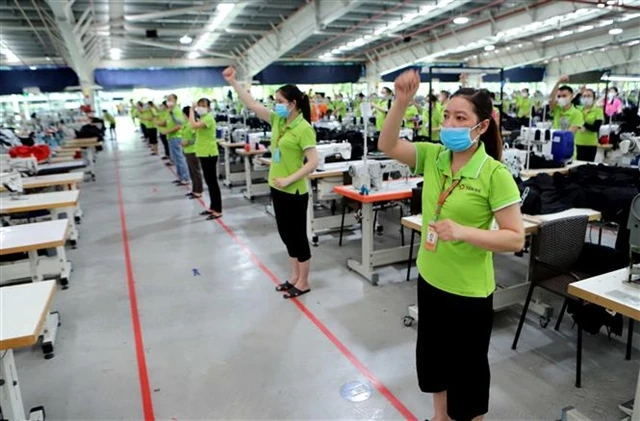
Hanoi (VNS/VNA) - The Vietnam General Confederation of Labour (VGCL), the sole representative of Vietnamese worker's interests and unified trade union organisation in the country, has for the second time this year called on the Government to reduce the weekly working hours for the private sector workers from 48 to 44, and eventually to 40 hours per week.
Dr Nguyen Thi Lien, Head of the Department of Business Human Resource Management at the Vietnam University of Commerce in Hanoi, said the shorter working week proposal was scientifically researched, practical and in line with global norms.
Extensive research has shown that reducing working hours allows workers to rest, rejuvenate, spend more time with their families, providing a wide range of well-being and social benefits. Businesses also benefit when workers come back fully rested and more committed to their jobs, fewer mistakes are made and productivity increases.
Lien, however, said reducing working hours should be implemented gradually to allow room for adjustments and allow proper assessment from both businesses and workers.
It must be properly communicated that reducing working hours does not necessary mean lower incomes.
She said the key to the challenge of maintaining national competitiveness and investment while giving workers more time to rest, is increased labour productivity.
"Businesses must invest more in technologies and automation, improve workflow and the working environment. Workers should be geared toward being adaptive, creative and producing advanced products," Lien said.
She advised the Government to implement additional policies to stimulate creativity and innovation while raising the nation's minimum wage and workers' living standards. As incomes increase, reduced working hours allow more time for family, rest and recreational activities, which aligns with global development trends.
She added that reducing working hours will inevitably happen in the future, but the timing and implementation need careful planning and execution.
Dr Cao Van Sam, Chairman of the Advisory Council at the Institute for Human Resources Training and Development, said the proposal to reduce working hours was brought to and approved by the 2019 National Assembly's Resolution 101. However, policymakers must strike a balance between labour productivity and the ability to ensure minimum living conditions for workers and meet various conditions for implementation.
"There should be thorough research based on scientific principles and practical approaches to build a roadmap that allows for reduced working hours and increased labour productivity," he said.
Sam said tests should be carried out in businesses that meet all the conditions for implementation before the country's labour authorities implement national-scale policies.
"There have to be solutions to ensure workers that reducing their working hours will not hurt their income significantly, as well as their employers' competitiveness and investment. Workers must be encouraged to improve their crafts, contributing to improved labour productivity," he said.
Businesswoman Nancy Ngo Thi Bich Quyen, VP of BNI Vietnam and a human resource management expert, said that while better regulations for workers are necessary, the impact on businesses must be considered.
"Vietnam remains among the countries with low labour productivity while wages are no longer exceptionally low in comparison to its regional average. The mindset of the young generation is to try out new fields and constantly seek for better employment opportunities," she said.
She said, to be practical and sustainable, the proposal must balance the interests of employers and workers./.






















